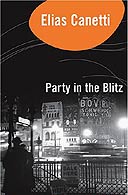
Party in the Blitz
by Elias Canetti
Harvill £17.99, pp208
When he began these memoirs of his life in London the Nobel Laureate Elias Canetti was 85. He worked on them, on and off, up to his death four years later in 1994.
Never shy to face up to the truths of life, schooled as he was in the major political upheavals of the century, he nevertheless discovered extra license in his advanced age. The book seems to have been intended as a parting shot at the society he entered in England; a nicely calculated piece of sniping at the liberals who welcomed him, stiffly, when he escaped from Vienna after his writings had been banned by the Nazis in 1939.
The title suggests a kind of wartime bonhomie that the writer seldom experienced. The home front parties Canetti describes, mostly Hampstead literary events, are 'senseless and heartless, every bit in keeping with such cold people'.
They are thrown by the poet and critic William Empson, or at the smart home of Canetti's English editor Veronica Wedgwood. The author moves among these soirees with consummate Austrian glumness knowing no one and, worse, no one knowing him, despite the fact that his great book Auto da Fé was already behind him. From time to time he was asked in a disinterested way, by a Toynbee or a Percy, if he had known Kafka, since he came from over that way, but mostly he was awkwardly ignored.
Fifty years on, these slights recalled, Canetti obviously rather fancied the idea of getting his own back. The result is a series of memorable, pointed vignettes of the intellectual figures of wartime and after. Canetti is never less than dry, and frequently venomous, a tone captured perfectly in Michael Hofmann's translation. The author reserves special scorn for the social 'dictatorship' of TS Eliot, often the star guest at these evenings, and occasionally called on to recite poems that are invariably, to Canetti's ears, 'spittoons of failure'; (he defiantly loves Dylan Thomas for having the presence to undermine Eliot's stifling authority).
If the men, Eliot and Empson in particular, suffer in these pages for their arrogance, and for their desiccated misogyny, the women fare little better. Canetti remained wonderfully angry to the end, for example, at the number of evenings he had wasted listening to the Blakean ins and outs of the poet Kathleen Raine's love life.
He is often even less charitable toward his own numerous lovers. The most celebrated of these, Iris Murdoch, is treated with an astonishing disgust in his memory, an embarrassingly supine conquest who in the bedroom took off layer upon layer of things 'that didn't have anything remotely to do with love, it was all woollen and ungainly' before lying 'unmoving and unchanged... [so that] I barely felt myself enter her ... perhaps I might have felt something had she resisted in some form. But that was as much out of the question as any pleasure ...' Things got worse when the novelist departed the boudoir, her flat feet in 'grotesque sandals', walking like a 'repulsive bear'.
In among this London society, Canetti reckoned he had one single reader who had the German and the wit to have read his Auto Da Fé. That that person is the great sinologist Arthur Waley is no particular comfort to him. Canetti recounts a conversation between his wife, the somewhat long-suffering Veza and Waley, which founders on questions of taste. Thomas Mann couldn't write, Waley asserts, Dickens was 'no good at all' and so on, until the enthusiasms of Mrs Canetti are snobbishly crushed one by one.
'When I think of England I always think of people with whom I had detailedly insipid conversations,' Canetti suggests, but his recollections of these conversations are anything but insipid. If his book was mostly inspired by bitterness, it is salvaged by his great sense of history and humanity, and the exactness of his prose.
Despite the bitchiness, and because of it, Canetti proves himself a pre-emiment authority of that perennially curious social gathering, the London literary evening, his thesis a nice little coda to his life's work on Crowds and Power. And you are left in no doubt that he was, as he well knew, always the life and soul of the party.

